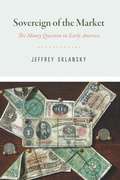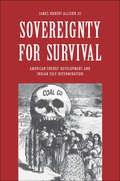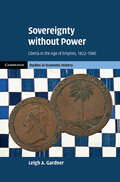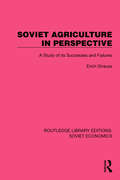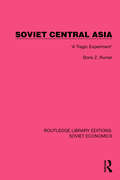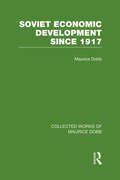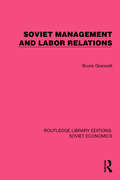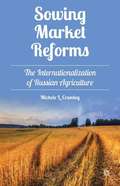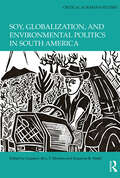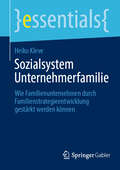- Table View
- List View
Sovereign of the Market: The Money Question in Early America
by Jeffrey SklanskyWhat should serve as money, who should control its creation and circulation, and according to what rules? For more than two hundred years, the “money question” shaped American social thought, becoming a central subject of political debate and class conflict. Sovereign of the Market reveals how and why this happened. Jeffrey Sklansky’s wide-ranging study comprises three chronological parts devoted to major episodes in the career of the money question. First, the fight over the innovation of paper money in colonial New England. Second, the battle over the development of commercial banking in the new United States. And third, the struggle over the national banking system and the international gold standard in the late nineteenth century. Each section explores a broader problem of power that framed each conflict in successive phases of capitalist development: circulation, representation, and association. The three parts also encompass intellectual biographies of opposing reformers for each period, shedding new light on the connections between economic thought and other aspects of early American culture. The result is a fascinating, insightful, and deeply considered contribution to the history of capitalism.
Sovereignty and Land Rights of Indigenous Peoples in the United States
by Wayne EdwardsThis book presents a comparative study of the land settlements and sovereign arrangements between the US government and the three major aggregated groups of indigenous peoples—American Indians, Native Alaskans, and Native Hawaiians—whose land rights claims have resulted in very different outcomes. It shows that the outcomes of their sovereign claims were different, though their bases were similar. While the US government insists that it is committed to the government-to-government relationship it has with the tribes, federal authority severely limits the ability of tribal governments to participate as an equal partner.
Sovereignty for Survival
by James Robert Allison IIIIn the years following World War II many multi-national energy firms, bolstered by outdated U. S. federal laws, turned their attention to the abundant resources buried beneath Native American reservations. By the 1970s, however, a coalition of Native Americans in the Northern Plains had successfully blocked the efforts of powerful energy corporations to develop coal reserves on sovereign Indian land. This challenge to corporate and federal authorities, initiated by the Crow and Northern Cheyenne nations, changed the laws of the land to expand Native American sovereignty while simultaneously reshaping Native identities and Indian Country itself. James Allison makes an important contribution to ethnic, environmental, and energy studies with this unique exploration of the influence of America's indigenous peoples on energy policy and development. Allison's fascinating history documents how certain federally supported, often environmentally damaging, energy projects were perceived by American Indians as potentially disruptive to indigenous lifeways. These perceived threats sparked a pan-tribal resistance movement that ultimately increased Native American autonomy over reservation lands and enabled an unprecedented boom in tribal entrepreneurship. At the same time, the author demonstrates how this movement generated great controversy within Native American communities, inspiring intense debates over culturally authentic forms of indigenous governance and the proper management of tribal lands.
Sovereignty without Power: Liberia in the Age of Empires, 1822–1980 (Cambridge Studies in Economic History - Second Series)
by Leigh A. GardnerWhat did independence mean during the age of empires? How did independent governments balance different interests when they made policies about trade, money and access to foreign capital? Sovereignty without Power tells the story of Liberia, one of the few African countries to maintain independence through the colonial period. Established in 1822 as a colony for freed slaves from the United States, Liberia's history illustrates how the government's efforts to exercise its economic sovereignty and engage with the global economy shaped Liberia's economic and political development over the nineteenth and twentieth centuries. Drawing together a wide range of archival sources, Leigh A. Gardner presents the first quantitative estimates of Liberian's economic performance and uses these to compare it to its colonized neighbors and other independent countries. Liberia's history anticipated challenges still faced by developing countries today, and offers a new perspective on the role of power and power relationships in shaping Africa's economic history.
Soviet Agriculture in Perspective: A Study of its Successes and Failures (Routledge Library Editions: Soviet Economics #14)
by Erich StraussSoviet Agriculture in Perspective (1969) examines the framework within which Soviet agriculture had to operate from the start: the dilemma of a revolutionary regime in a backward peasant country, the straightjacket of a bureaucratic system inherited from Tsarism, made even more rigid by the internal tensions of the new society, and the imperative needs of economic development. In analysing Soviet agricultural policy, it looks at the appropriate volume of agricultural output, the need for massive capital investment, the level of prices and costs, and the optimum size of a farm.
Soviet Central Asia: 'A Tragic Experiment' (Routledge Library Editions: Soviet Economics #15)
by Boris Z. RumerSoviet Central Asia (1989) explores the economic development of the four republics of Central Asia that suffered under Moscow’s economic policies – Uzbekistan, Tajikistan, Turkmenistan and Kirghizia. The Soviet literary weekly Literaturnaia gazeta described Soviet economic policies there as a ‘tragic experiment’, and this book argues that Central Asia serves as a prime example of the failure of Soviet regional development policies. It analyses the special role of the region in the Soviet economy and such key issues as industrial development, cotton production, water resources and labour. It also addresses the social ramifications of the underdevelopment of the region’s economy and the impact of new policies under Gorbachev.
Soviet Communal Living
by Paola MessanaThis book brings together fascinating testimonies from thirty inhabitants of the 'Kommunalka,' the communal apartments that were the norm in housing in the cities of Russia during the whole history of the Soviet Union.
Soviet Economic Development Since 1917
by Maurice DobbThis book follows on from the author’s volume Russian Economic Development and although it encompasses some of the same material it charts the history and progress of the Soviet economy down to the efforts at reconstruction after The Second World War. A new chapter was added which covers the post-war decade from the end of the war to the announcement of the Sixth Year Plan.
Soviet Economy and the War bound with Soviet Planning and Labour
by Maurice DobbIn Soviet Economy and the War the author presents a concise factual record of Soviet economic developments during a short period. This book outlines the economic planning and performance that accompanied the military training and preparation to meet the onset of Nazism. To some extent complementary to Dobb's Soviet Economy & the War, the author offers detailed studies of a few special aspects of the Soviet Economic System.
Soviet Management and Labor Relations (Routledge Library Editions: Soviet Economics #20)
by Bruno GrancelliSoviet Management and Labor Relations (1988) examines the official model of Soviet labor relations and the operational reality. It outlines the main characteristics of labor relations during Russia’s three major historical industrialisation drives, and the attitude toward work, entrepreneurs and the state bureaucracy displayed by workers with peasant origins and culture. It then deals with the main aspects of the official model of labor relations and legislation; Soviet management practices and labor relations, industrial relations, strategic behaviour and collective actions.
Sowing Market Reforms
by Michele L. CrumleyBy examining a sector of the economy that was exposed to increased imports more than four decades ago, Crumley illuminates the economic pressures, resistance, and reform that help to shape Russia's agrarian sector today.
Soy, Globalization, and Environmental Politics in South America (Critical Agrarian Studies)
by Susanna B. Hecht Gustavo de L. T. OliveiraSoy in South America constitutes one of the most spectacular booms of agro-industrial commodity production in the world. It is the pinnacle of modernist agro-industrial practices, serving as a key nexus in food–feed–fuel production that underpins the agribusiness–conservationist discourse of "land sparing" through intensification. Yet soy production is implicated in multiple problems beyond deforestation, ranging from pesticide drift and contamination to social exclusion and conflicts in frontier zones, to concentration of wealth and income among the largest landowners and corporations. This book explores in depth the complex dynamics of soy production from its diverse social settings to its transnational connections, examining the politics of commodity and knowledge production, the role of the state, and the reach of corporate power in everyday life across soy landscapes in South America. Ultimately, the collection encourages us to search and struggle for agroecological alternatives through which we may overcome the pitfalls of this massive transnational capitalist agro-industry. This book was originally published as a special issue of The Journal of Peasant Studies.
Soziale Aspekte der Führung: Selbstführung – Fremdführung – Horizontale Beziehungen
by Peter Hennerfeind Barbara Hennerfeind Regina SwobodaDieses Buch beschreibt die vielfältigen Facetten der sozialen Kompetenz, welche für erfolgreiche Mitarbeiterführung wesentlich wichtiger und entscheidender ist als die bloße Anwendung von Managementwerkzeugen. Es ist übersichtlich eingeteilt und beginnt als erstem Schritt mit der Selbstführung. Denn nur wer sich selbst ausreichend kennt und versteht, kann mit innerer Sicherheit führen. Darauf aufbauend befassen sich die Autoren mit der Fremdführung – also der Führung von Mitarbeitern – und abschließend mit horizontalen Beziehungen, bei denen ganz besonders der Kunde im Vordergrund steht. Anerkannte Theorien beispielsweise von Peter Drucker oder Fredmund Malik werden einer Analyse unterzogen, um deren meist sehr sachliche Zugänge zum Thema Management und Führung mit den wichtigen sozialen Herangehensweisen zu konfrontieren. Angehende, aber auch bereits erfahrene Führungskräfte finden in diesem Buch ein breites Spektrum an praktischen Informationen und zukunftsfähigen Handlungsanleitungen, um ihre Aufgaben in einer sich ständig ändernden Umgebung effektiv und kompetent zu erfüllen.
Soziale Bewegungen und der Wandel der Wirtschaftseliten in Europa nach 1945
by Stefan Berger Marcel BoldorfDieses Buch untersucht den Wandel der sozialen Bewegungen und der Wirtschaftseliten in Europa nach dem Zweiten Weltkrieg. In den Jahren nach 1945 stand Europa vor vielfältigen Herausforderungen, die durch die übergeordnete Frage verbunden waren, wie der Wiederaufbau des Kontinents vonstatten gehen sollte. Für die Mittelmächte lag die Umsetzung in den Händen der alliierten Besatzungsmächte, die den Prozess der Entnazifizierung und den Aufbau einer neuen Wirtschaftsordnung organisierten. In den Ländern, die nicht militärisch besetzt waren, bestand eine tiefe Kluft zwischen den neuen Regierungskräften und den ehemaligen Kollaborateuren. In beiden Fällen übernahmen soziale Bewegungen, die von Antifaschisten auf der linken Seite des politischen Spektrums gebildet wurden, die Aufgabe der gesellschaftlichen Neuordnung. Die Kapitel in diesem Buch untersuchen die Diskurse über die Wirtschaftssysteme und ihre Eliten, die in einer Reihe von europäischen Ländern in den Vordergrund rückten, und decken auf, wer daran beteiligt war, auf welche Widerstände diese sozialen Bewegungen stießen und wie es ihnen im Westen letztlich nicht gelang, einen Wandel herbeizuführen, während der Stalinismus in Osteuropa den Wandel gewaltsam erzwang.
Soziale Herkunft: Ein Praxisbuch über soziale Herkunft, Aufstiegshürden und gerechtere Chancen in Unternehmen (essentials)
by Rebecca Caric Sarah RiedenbauerDieses essential öffnet die Augen für eine Dimension sozialer Ungleichheit, die im Diversitätsdiskurs bislang kaum beachtet wird. Mit einem klaren Blick auf Strukturen, ungeschriebene Regeln und verfestigte Netzwerke zeigt es, wie soziale Herkunft Karriereverläufe, Aufstiegschancen und Teilhabe in der Unternehmenswelt prägt. Anhand von Analysen, praktischer Beispiele aus österreichischen Unternehmen und Reflexionen über Leistungsmythen und elitäre Systeme lädt dieses essential dazu ein, soziale Herkunft als das zu begreifen, was sie ist: eine entscheidende Größe im Kampf um echte Chancengerechtigkeit in der Arbeitswelt.
Soziale Innovationen in und von Organisationen: Sozialwissenschaftliche Studien zur Transformation von Organisation (Sozialwissenschaften und Berufspraxis)
by Birgit Blättel-Mink Andreas Schröer Katrin Späte Antonius SchröderSoziale Innovationen in, von und durch Organisationen lassen sich aktuell vor allem vor dem Hintergrund von Ökologisierung und Digitalisierung beobachten. Die Beiträge des Bandes adressieren die Mechanismen solcher und anderer sozialer Innovationsprozesse und fragen dabei auch nach der Nachhaltigkeit bzw. Überlebensfähigkeit von Organisationen angesichts der aktuellen Herausforderungen.
Soziale Integration durch gemeinschaftliche Wohnkonzepte für die Silver Society: Kriterienkatalog für nutzerorientierte Immobilienentwicklung (Studien zum nachhaltigen Bauen und Wirtschaften)
by Yina ZhaoDiese Veröffenlichung untersucht Lösungansätzen für die Immobilienentwicklung zur Verbesserung der sozialen Integration und des persönlichen Wohlbefindens Älterer bei Gemeinschaftswohnformen.
Soziale Marktwirtschaft harrt auf Erfüllung: Eine Stellungnahme (essentials)
by Alfred JureczekIn diesem essential ergründet der Autor, was man sich von der Sozialen Marktwirtschaft verspricht, warum die Soziale Marktwirtschaft nicht „sozial“ ist und Lohnsteigerungen nicht helfen, sie sozialer zu machen. Dabei treibt ihn vor allem der Wunsch nach mehr Solidarität. Seine Thesen sind klar und deutlich als Aufruf zu verstehen: Die aktuelle Lohnpolitik führt zur Minderung der Kaufkraft und der Nachfragekraft des Lohns. Das Aufbauen von Vermögen durch Arbeiter scheint nahezu unmöglich. Und die soziale Verantwortung wird nur noch den Tafeln, der Agenda 2010 und dem Mindestlohn überlassen. Um die Gerechtigkeitslücke zu schließen, braucht es ein radikales Umdenken, das Arbeitenden Anteile an Unternehmensgewinnen ermöglicht. Ein Neuentwurf der Erbschaftssteuer für Betriebsvermögen könnte dabei helfen.
Soziale Marktwirtschaft und Freiheit: Analyse – Herausforderungen – Reformvorschläge (FOM-Edition)
by Peter AltmiksDieses Buch beschäftigt sich mit der Entwicklung und Zukunft der Sozialen Marktwirtschaft und den damit zusammenhängenden Ausprägungen der Freiheit. Es beschreibt und analysiert den Zustand der Sozialen Marktwirtschaft sowie die wirtschafts- und finanzpolitischen Fehler und liefert fundierte Reformvorschläge. Auch das Spannungsfeld zwischen Freiheit und dem notwendigen Setzen von Rahmenbedingungen wird beleuchtet. Welche Freiheitsgrade sind möglich? Warum hat die bewährte Soziale Marktwirtschaft an Reputation verloren? Wurde das ursprüngliche Konzept unzureichend oder sogar fehlerhaft umgesetzt? Die Beitragsautorinnen und Beitragsautoren beantworten diese Fragen und bieten Orientierung in einer Zeit der Unsicherheit.
Soziale Netzwerkbeziehungen in Coworking Spaces: Eine Untersuchung zur organisationalen Einbettung von Freelancer*innen
by Michael T. KnappDie Studie von Michael Knapp befasst sich mit den sozialen Netzwerkbeziehungen von Freelancer*innen im Kontext von Coworking Spaces als flexibel nutzbare Büro- und Arbeitsräumlichkeiten. Dabei wird insbesondere auf die Bedeutung dieses Kontexts in Bezug auf die Beziehungs- und Netzwerkbildung eingegangen und gezeigt, wie die Nutzung eines Arbeitsplatzes in diesem zur organisationalen Einbettung im Freelancing beitragen kann. Dazu greift die Arbeit auf Methoden der egozentrierten Netzwerkanalyse in Kombination mit qualitativen Interviews zurück. Anhand von persönlichen Freelancer*innen-Netzwerken, biografischen und sozial-räumlichen Hintergründen werden verschiedene Beziehungsinhalte und -konstellationen deutlich gemacht, die sich aus der Arbeit im Coworking Space ergeben können. Die Studie trägt damit zum Verständnis von Coworking Spaces für unternehmerische Prozesse im Freelancing bei und verweist auf die Relevanz von sozial-räumlicher Kontextualisierung.
Sozialisation von Nachkommen aus Unternehmerfamilien: Familiendynamik und Unternehmensnachfolge (essentials)
by Simon CasparyDurch die Verbindung einer Familie mit einem Unternehmen erleben sich die Nachkommen in einer spezifischen Lebenswelt, die deren Identität und deren Lebensweg unweigerlich prägt. Viele familiäre Dynamiken laufen in der Unternehmerfamilie unbewusst ab. Insbesondere während einer Unternehmensnachfolge können Konflikte entstehen, die ihren Ursprung bereits in der Kindheit der Nachfolger haben. Dieses Buch beleuchtet die strukturellen Besonderheiten einer Unternehmerfamilie. Familiendynamische Aspekte beeinflussen Nachkommen und Unternehmerschaft. Hilfreiche Übungen und Fragestellungen helfen dabei, diese Sozialisation zu reflektieren.
Sozialismus mit menschlichem Antlitz: Die Anwendung von Verhaltensökonomie zur Erforschung der wirtschaftlichen Geschichte in Ostdeutschland
by Wayne Geerling Gary B. MageeDie Wirtschaftsgeschichte Ostdeutschlands wird in der Regel als eine Geschichte des Zusammenbruchs eines von Natur aus fehlerhaften Systems erzählt. Doch obwohl die Ineffizienz des Systems unbestreitbar ist, war seine Wirtschaftsgeschichte viel reicher, als seine vergleichsweise schlechte Wirtschaftsleistung vermuten lässt. Für viele, die dort lebten, war es ein System, das in den vierzig Jahren seines Bestehens zu Leistungen fähig war und im Allgemeinen auf einem erträglichen Niveau funktionierte. Dieses Buch kombiniert die Erkenntnisse der Verhaltensökonomie mit Archivrecherchen, um die Schichten der Rhetorik und der Annahmen über die ostdeutsche Wirtschaft abzuschälen und Aspekte der zugrunde liegenden Funktionalität zu untersuchen. Anhand einer Reihe von Fallstudien, die die Einrichtung sozialistischer Arbeitsplätze, das Streben nach Produktivitätssteigerung und Effizienz sowie die Entstehung der Finanzkrise untersuchen, betrachtet das Buch das System aus der Perspektive der Menschen, die es betrieben und die Entscheidungen trafen, die es zum Funktionieren brachten. Unbelastet von politischen Vorurteilen bietet es ein realistischeres Verständnis der ostdeutschen Wirtschaftsgeschichte als dasjenige, das sich aus festgefahrenen Debatten über den Zusammenprall der Systeme ergibt. Die vorgestellten neuen Perspektiven und Ansätze zeigen, dass die ostdeutsche Wirtschaftsgeschichte, herausgelöst aus ihrem Kontext des Kalten Krieges, als das analysiert werden kann, was sie war, und nicht als das, was sie symbolisierte.
Sozialistische Ökonomie im Spannungsfeld der Modernisierung: Ein ideengeschichtlicher Vergleich DDR – Polen
by Piotr Koryś Hans-Jürgen Wagener Maciej TymińskiDie DDR und Polen haben von 1945 bis 1989 versucht, das kollektivistische Modernisierungsprojekt zu verwirklichen – den real existierenden Sozialismus. Das Buch vergleicht die unterschiedliche Entwicklung der systemtheoretischen und wirtschaftspolitischen Ideen in beiden Ländern. Trotz einer identischen Grundordnung mit Staatseigentum und Zentralplanung entfalteten die ostdeutschen und polnischen Ökonomen eigene Vorstellungen. Dabei waren die Spielräume durch den politischen und ideologischen Einfluss der sowjetischen Führungsmacht beschränkt. Darin ist eine der entscheidenden Barrieren für eine erfolgreiche Modernisierung zu sehen. Die Ordnungspolitik erwies sich am Ende als unfähig, das System an die Anforderungen der Moderne anzupassen und zu reformieren.Die Entwicklung des ökonomischen Denkens zweier sozialistischer Länder wird in ihrem historischen, politischen und institutionellen Kontext dargestellt und richtet sich somit an Geschichts-, Wirtschafts- und Politikwissenschafter*innen gleichermaßen.
Sozialklimawandel in der Komfortgesellschaft: Konsumbasierte Verletzungen und Illusionen
by Günther RosenbergerAnlass für dieses Buchs sind die zunehmende Kälte im Umgang der Bürger miteinander und ihre mangelnde Empathie: normenverletzendes Handeln zulasten der Mitmenschen, Hassausbrüche in sozialen Netzen, Übergriffigkeiten jeder Art. Oft wird vor einem Auseinanderfallen des gesellschaftlichen Zusammenhangs gewarnt, manche Protestformen gewinnen gar bürgerkriegsähnlichen Charakter. Welche Rolle spielen dabei hedonistischer Konsum, Identitätszweifel, die Suche nach Selbstwert und eskapistisches Verhalten? Wo die Ursachen dieses Sozialklimawandels zu suchen sind, untersucht das Buch anhand zeittypischen Verhaltens.
Sozialsystem Unternehmerfamilie: Wie Familienunternehmen durch Familienstrategieentwicklung gestärkt werden können (essentials)
by Heiko KleveFamilienunternehmen werden von einem Familienprinzip geprägt, nämlich der Weitergabe von Generation zu Generation. Während in Familien das Leben transgenerational weitergereicht wird, so übergeben die Mitglieder von Unternehmerfamilien zudem das Unternehmenseigentum und die Verantwortung dafür an ihre nachfolgenden Generationen. Dafür müssen sie passende Entscheidungungen treffen: für ihr Unternehmen, ihr Eigentum und ihre Familien. Wie das erfolgreich gelingen kann, wird hier sowohl aus systemtheoretischer Sicht als auch praktisch mit Hilfe des Prozesses der Familienstrategieentwicklung gezeigt.
